Towards the end of the year for the past few years here at Experiments in Manga, I have made a point to compile a list of some of the manga, comics, and other books that have been released during the previous twelve months that to me were particularly notable for one reason or another. It’s not a “best of” list, nor is it necessarily a list of my favorite releases from the past year (although admittedly some of them are). Instead, it’s a list of books which stood out to me for one reason or another that I both read and were released in 2017. I certainly haven’t read everything that was published in the last year, so the following titles have been taken from an already limited selection. For the sake of this list, I also decided to focus on debuts and one-shots rather than ongoing series. And while the list doesn’t include all of the noteworthy releases or even all of my favorites from the last year, I have tried to highlight one of the trends from 2017 that made me particularly happy–the continued growth and inclusion of queer representation and themes within the works being published.
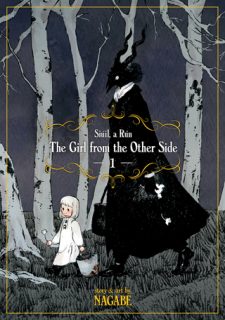 That being said, one of the manga that left the deepest and most lasting impressions on me in 2017 was The Girl from the Other Side: Siúil, a Rún by Nagabe. Both the series’ haunting story and beautiful artwork are marvelously atmospheric. Nagabe delicately balances sweetness and charm with darkness and tragedy. It isn’t unusual for horror manga to explore the monstrosity of humans and the humanity of monsters, but The Girl from the Other Side does so with incredible nuance.
That being said, one of the manga that left the deepest and most lasting impressions on me in 2017 was The Girl from the Other Side: Siúil, a Rún by Nagabe. Both the series’ haunting story and beautiful artwork are marvelously atmospheric. Nagabe delicately balances sweetness and charm with darkness and tragedy. It isn’t unusual for horror manga to explore the monstrosity of humans and the humanity of monsters, but The Girl from the Other Side does so with incredible nuance.
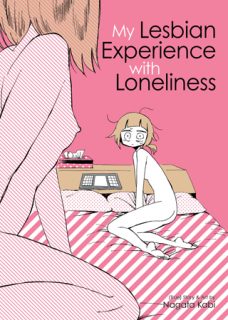 Manga tends to be a niche within the larger niche of comics, but every so often there is a work that gains recognition and acclaim outside of the usual audiences. Kabi Nagata ‘s autobiographical My Lesbian Experience with Loneliness is one example of a manga from 2017 that found a wide readership; Nagata’s authentic, frank, and honest depiction of her struggles with depression, anxiety, sexuality, and feelings of isolation resonated deeply with others’ personal experiences.
Manga tends to be a niche within the larger niche of comics, but every so often there is a work that gains recognition and acclaim outside of the usual audiences. Kabi Nagata ‘s autobiographical My Lesbian Experience with Loneliness is one example of a manga from 2017 that found a wide readership; Nagata’s authentic, frank, and honest depiction of her struggles with depression, anxiety, sexuality, and feelings of isolation resonated deeply with others’ personal experiences.
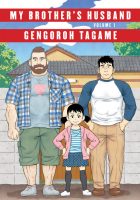 Gengoroh Tagame is an important creator who is known worldwide, so it’s probably no surprise that his series My Brother’s Husband would garner a fair amount of attention as well. Quite different in tone from Tagame’s sadomasochistic and homoerotic manga, My Brother’s Husband is a wholesome work which tackles and refutes socially and culturally ingrained prejudices–such as homophobia–through the lens of family. The manga’s message is not subtle, but it is a good one.
Gengoroh Tagame is an important creator who is known worldwide, so it’s probably no surprise that his series My Brother’s Husband would garner a fair amount of attention as well. Quite different in tone from Tagame’s sadomasochistic and homoerotic manga, My Brother’s Husband is a wholesome work which tackles and refutes socially and culturally ingrained prejudices–such as homophobia–through the lens of family. The manga’s message is not subtle, but it is a good one.
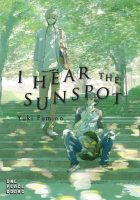 I Hear the Sunspot by Yuki Fumino is a quieter and more understated work dealing with the impact of disabilities on relationships, romantic and otherwise. It’s a lovely and thoughtful manga which treats its naturally complex characters with respect, acceptance, and understanding. I Hear the Sunspot is actually the beginning of a series, something that I didn’t realize when I first read it. The volume stands very well on its own, but I certainly look forward to reading more.
I Hear the Sunspot by Yuki Fumino is a quieter and more understated work dealing with the impact of disabilities on relationships, romantic and otherwise. It’s a lovely and thoughtful manga which treats its naturally complex characters with respect, acceptance, and understanding. I Hear the Sunspot is actually the beginning of a series, something that I didn’t realize when I first read it. The volume stands very well on its own, but I certainly look forward to reading more.
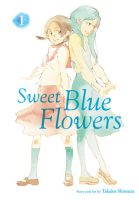 My introduction to the work of Takako Shimura was through Wandering Son, a manga which is tremendously meaningful to me. I was very happy then when her other major series, Sweet Blue Flowers, finally received a proper release in English in 2017. (It only took three different publishers.) On the surface, Sweet Blue Flowers can tend towards the melodramatic, but Shimura’s layered portrayals of young women who love other young women are still emotionally convincing and compelling.
My introduction to the work of Takako Shimura was through Wandering Son, a manga which is tremendously meaningful to me. I was very happy then when her other major series, Sweet Blue Flowers, finally received a proper release in English in 2017. (It only took three different publishers.) On the surface, Sweet Blue Flowers can tend towards the melodramatic, but Shimura’s layered portrayals of young women who love other young women are still emotionally convincing and compelling.
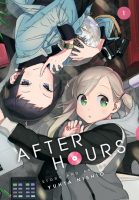 Most of the yuri that has so far been translated into English generally falls into the category of schoolgirl manga, so it is wonderfully refreshing to see series featuring adult women, like Yuhta Nishio’s After Hours, being published as well. It’s also immensely satisfying to see a relationship develop between two women that, while not without its complications, is largely free of angst. After Hours, along with Sweet Blue Flowers, is also notable for being Viz Media’s first real foray into the yuri genre.
Most of the yuri that has so far been translated into English generally falls into the category of schoolgirl manga, so it is wonderfully refreshing to see series featuring adult women, like Yuhta Nishio’s After Hours, being published as well. It’s also immensely satisfying to see a relationship develop between two women that, while not without its complications, is largely free of angst. After Hours, along with Sweet Blue Flowers, is also notable for being Viz Media’s first real foray into the yuri genre.
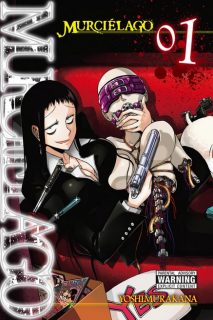 Yoshimurakana’s Murciélago is likewise a manga that features adult women in adult situations. But in this case, the series makes no attempt at realism. Murciélago is ridiculously over-the-top top and extreme. The manga is lewd and crass, but it can also be massively entertaining in its outrageousness. However, due to the explicit sex, violence, and gore, Murciélago is definitely not a series that can be recommended to just anyone. Predatory lesbian assassins understandably have limited appeal.
Yoshimurakana’s Murciélago is likewise a manga that features adult women in adult situations. But in this case, the series makes no attempt at realism. Murciélago is ridiculously over-the-top top and extreme. The manga is lewd and crass, but it can also be massively entertaining in its outrageousness. However, due to the explicit sex, violence, and gore, Murciélago is definitely not a series that can be recommended to just anyone. Predatory lesbian assassins understandably have limited appeal.
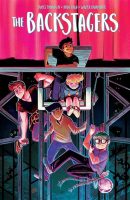 There were a great number of wonderful queer-friendly comics released in 2017, but James Tynion IV and Rian Sygh’s The Backstagers is particularly delightful. The comic is a tremendous amount of fun, featuring energetic artwork, an entertaining story, and a marvelously diverse cast. Especially noteworthy is the series’ challenging of gender stereotypes through the positive representations of a wide range of masculinities. The Backstagers even includes a transguy as a prominent character!
There were a great number of wonderful queer-friendly comics released in 2017, but James Tynion IV and Rian Sygh’s The Backstagers is particularly delightful. The comic is a tremendous amount of fun, featuring energetic artwork, an entertaining story, and a marvelously diverse cast. Especially noteworthy is the series’ challenging of gender stereotypes through the positive representations of a wide range of masculinities. The Backstagers even includes a transguy as a prominent character!
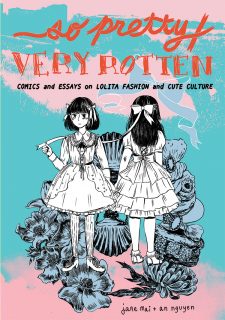 Another engaging work from 2017 that deals with gender, identity, and self-expression in interesting ways is So Pretty / Very Rotten: Comics and Essays on Lolita Fashion and Cute Culture by Jane Mai and An Nguyen. The individual pieces in the collaboration vary significantly in tone and style, ranging from accessibly academic to intensely personal, but the volume is an informative and fascinating examination of Lolita culture and its influence both inside and outside of Japan.
Another engaging work from 2017 that deals with gender, identity, and self-expression in interesting ways is So Pretty / Very Rotten: Comics and Essays on Lolita Fashion and Cute Culture by Jane Mai and An Nguyen. The individual pieces in the collaboration vary significantly in tone and style, ranging from accessibly academic to intensely personal, but the volume is an informative and fascinating examination of Lolita culture and its influence both inside and outside of Japan.
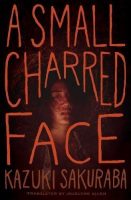 I don’t tend to seek out vampire fiction, so was it not for the fact that A Small Charred Face was written by Kazuki Sakuraba, translated by Jocelyne Allen, and published by Haikasoru, I might not have gotten around to reading the novel. Hearing A Small Charred Face described as being BL-adjacent certainly caught my attention, too. The novel is an unexpectedly beautiful and heartbreaking work about outsiders, found family, and the intimate connections that tie people together.
I don’t tend to seek out vampire fiction, so was it not for the fact that A Small Charred Face was written by Kazuki Sakuraba, translated by Jocelyne Allen, and published by Haikasoru, I might not have gotten around to reading the novel. Hearing A Small Charred Face described as being BL-adjacent certainly caught my attention, too. The novel is an unexpectedly beautiful and heartbreaking work about outsiders, found family, and the intimate connections that tie people together.
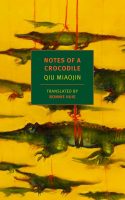 Miaojin Qiu was an influential lesbian author whose work has made a lasting impact on Taiwanese culture; her acclaimed novel Notes of a Crocodile is considered to be a cult classic of queer literature. The work is both metaphorical and literal in its exploration of gender, sexuality, and identity, combining fantasy and reality in a way that is tremendously compelling and at times even devastating. While not always an easy read, Notes of a Crocodile is a rich and powerful work.
Miaojin Qiu was an influential lesbian author whose work has made a lasting impact on Taiwanese culture; her acclaimed novel Notes of a Crocodile is considered to be a cult classic of queer literature. The work is both metaphorical and literal in its exploration of gender, sexuality, and identity, combining fantasy and reality in a way that is tremendously compelling and at times even devastating. While not always an easy read, Notes of a Crocodile is a rich and powerful work.
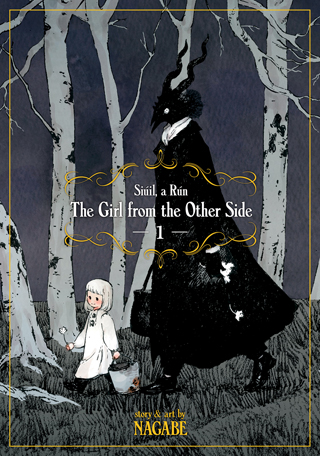
In addition to some of the ones you’ve listed, I also really enjoyed To Your Eternity and Spirit Circle. To Your Eternity was especially impressive to me, I can’t wait for my vol 2 to come in!
My most anticipated release for 2018 is probably Claudine (because I am just going to assume Rose of Versailles is never happening).
My most disappointing 2017 series is probably Golden Kamuy. I think I was kind of expecting something more like To Your Eternity (which I didn’t realize until I read To Your Eternity), but vol 1 had promise, but then vol 2 got way too caught up in the minutiae of things like skinning and cooking rabbits to the point where that’s what I currently remember most about the series. If the author wants to educate on culture, I don’t mind it on the side, but having it dominate everything in the story is just exhausting for me and makes me wonder when it’s ever going to get a move on. If I wanted to read a manga about cooking, I’d read What Did You Eat Yesterday, which is at least up front about it being a cooking manga.
Yes! Those were some of my favorites from the year as well! I expected great things from To Your Eternity before reading it (and the first volume was indeed excellent) but the beginning of Spirit Circle actually took me by surprise with how good it was. I’ll definitely continue following both series. I actually haven’t read beyond the first volume of Golden Kamuy yet, though I did greatly enjoy it.